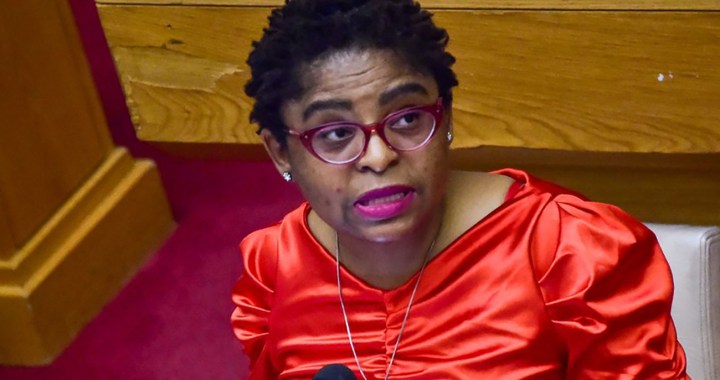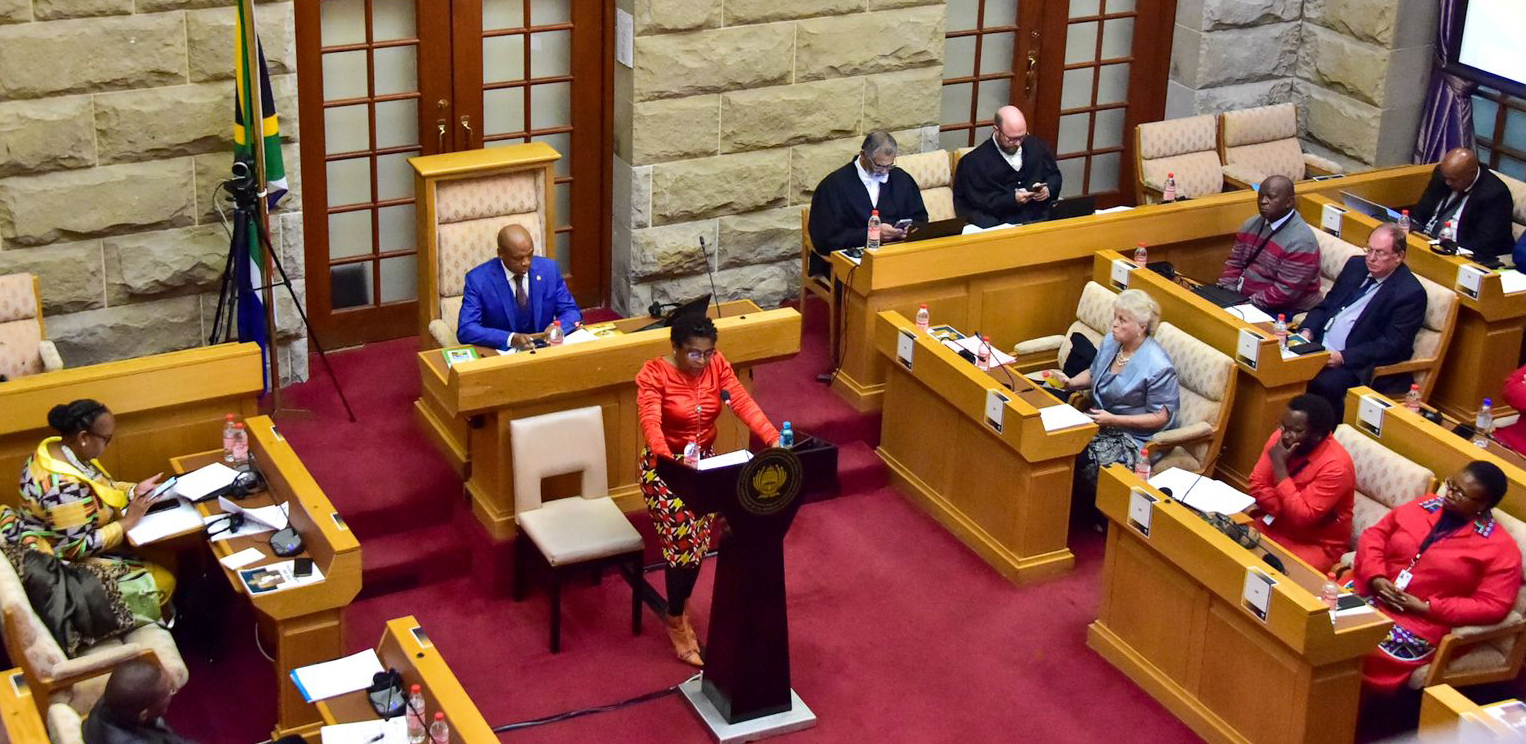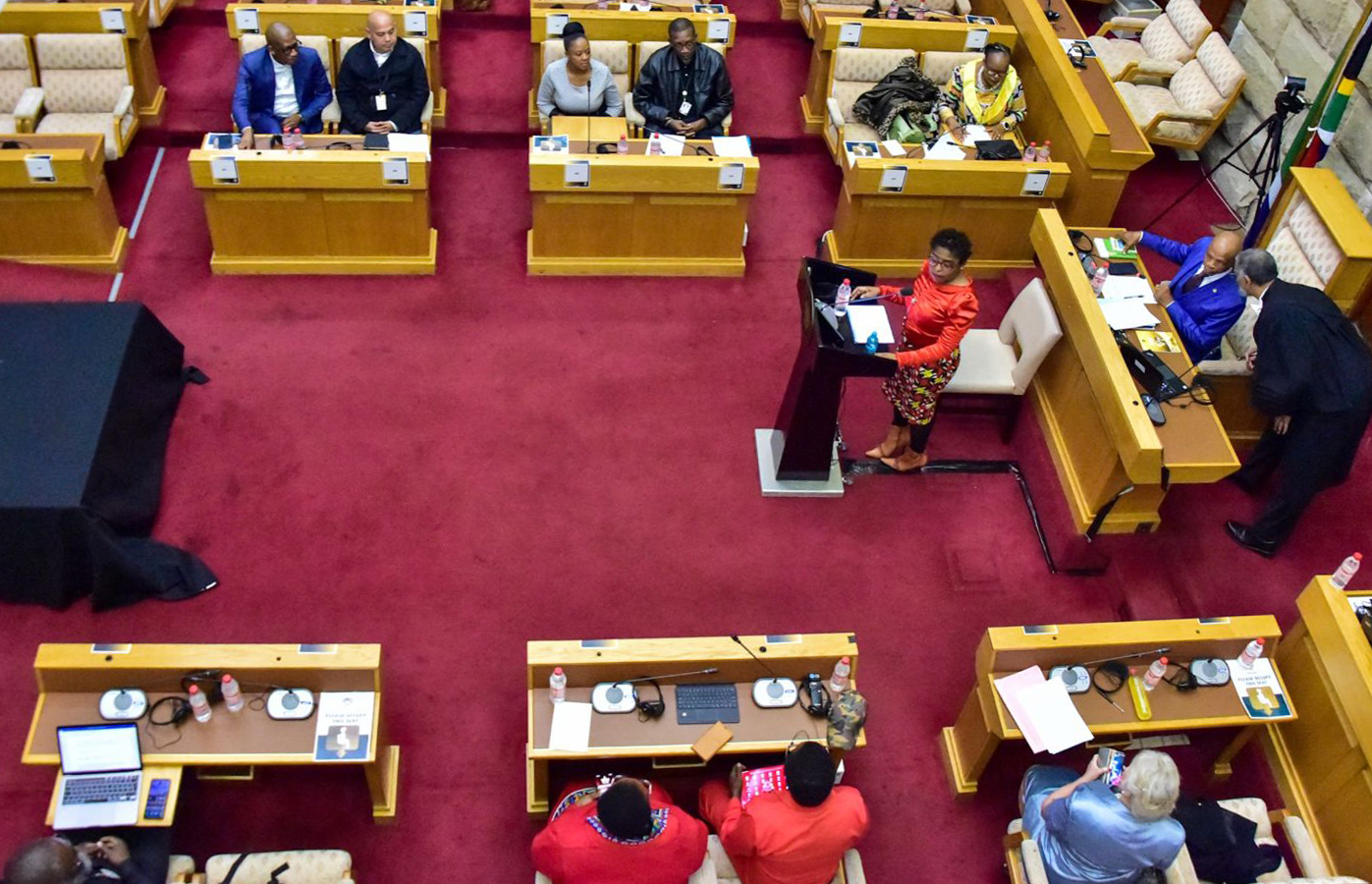BUDGET VOTES
SSA as bulwark for SA security and sovereignty, says Ntshavheni — but MPs point to missing cash, tools and laws

A legislative stand-off is in the making over amending the General Intelligence Laws Act, as MPs decided to take charge after years of waiting on Cabinet. On Friday, Minister in the Presidency Khumbudzo Ntshavheni announced a draft law would be ready for Cabinet next week.
In closing Friday’s State Security Budget vote debate, Minister in the Presidency Khumbudzo Ntshavheni seemed somewhat taken aback at Parliament’s Joint Standing Committee on Intelligence (JSCI) decision to do a committee Bill.
That’s not an unsurprising ministerial response. A committee Bill is a highly unusual step. ANC lawmakers generally use their majority to nix such efforts, and also Private Member’s Bills, in favour of awaiting draft laws from ministers — even if delays mean Parliament has to request extra time from the Constitutional Court as happened twice on the Electoral Laws Amendment Act.
Read more in Daily Maverick: MPs approve electoral legislation for 2024 independents despite misgivings, and IEC needs a new commissioner
“As a committee… we took a decision to make sure that we introduce Gilab (General Intelligence Law Amendment Bill) as a committee Bill. We’ve waited for quite some time. We cannot reverse on this decision. We know what it is that needs to be done… Our aim is to make sure that by the end of this term, this would have been done,” said ANC Deputy Chief Whip Doris Dlakude, pointing out this amendment legislation, dubbed Gilab, was the cornerstone” for the intelligence services functioning.
“I feel abandoned and I feel rejected… I’ve spent sleepless night with the team to ensure the consultations are finalised, the standing committee does not want to give me an opportunity, even if it means giving me a deadline, to deliver on the Gilab… I’d like to plead my case,” the minister responsible also for the State Security Agency (SSA) said in concluding Friday’s debate.
Whether the JSCI would be open to hearing out the minister and waiting for her legislation remains to be seen. The much talked about legislative amendments — crucially, but not only splitting domestic and foreign intelligence — go back almost five years ago to the 2018 High Level Panel Review Report on the SSA.
Crucial, will also be whether this round of lawmaking will be in public by a committee whose MPs are security vetted and sit in secret behind closed doors. In 2012, a sub-committee of the JSCI sat in public to draft the General Intelligence Laws Act, which reviewed and updated a handful of older intelligence-related laws.

Minister in the Presidency, Khumbudzo Ntshavheni, presents the State Security Agency budget policy statement to the National Assembly of Parliament on 19 May, 2023. (Photo: GCIS)
On Friday, Ntshavheni indicated the Cabinet draft legislation would cover other elements aside from separating domestic and foreign intelligence services, like tightening requirements of the Financial Action Task Force (Fatf), the global anti-money laundering and terror financing watchdog. South Africa has been greylisted. Changes would include remedying “signals intelligence capacity”, effectively interception or bugging, and empowering “national security structures to investigate or assess if a person is of national security interest”.
It remains unclear when, if at all, the national security policy will come to Parliament. The National Security Council has been reestablished by President Cyril Ramaphosa as gazetted in late 2020.
But the Budget vote debate stood out for its non-partisan, cooperative approach. Both the ANC and DA said politics were left at the door to prioritise national security amid Budget cuts and other troubles like the lack of regulations for SSA and others.
This does not mean no astute observations were made, like on the bedraggled SAPS crime intelligence, according to DA MP Dianne Kohler Barnard.
“We can’t grill the new (police) national commissioner about it as the whole country knows, he doesn’t have security clearance. He can’t even come into the building.”
JSCI chairperson ANC MP Jerome Maake’s contribution included confirming that on 31 January 2023, Parliament submitted the relevant Zondo Commission findings and recommendations to the committee that sits behind closed doors.
And while once a year, no later than the end of May, the JSCI must deliver a report of its work to Parliament — like the Budget vote debate, a rare glimpse into intelligence — Maake seemed to bash any expectation of SSA and intelligence transparency.
“Some people will be disappointed,” he said after quoting Clause 6(3) of the Intelligence Oversight Act.
“Nothing shall be included in any report of the Committee, the inclusion of which will be more harmful to the national security than its exclusion will be to the national interest.”
Traditionally, very few, if anyone in South Africa, is pushing against limits — even as unnecessary and overbearing secrecy has been cited as a failure in key investigations, both the 2018 High Level Panel Review Report on the SSA and the Expert Panel into the July 2021 public violence.
Such secrecy extends also to the allocations from the national purse.
“Secret Services facilitates transfer payments to the South African Secret Services, which provides government with accurate, topical, policy, relevant and timeous foreign intelligence to promote, enhance and protect national security and the interests of South Africa and its citizens,” said the National Treasury’s Estimates of National Expenditure on State Security.
Just over R4.79-billion are transferred to the Secret Services Account for operations, with another R385.3-million of what’s called “capital” and R365.9-million for machinery and equipment.
Allocations for capital and equipment are somewhat lower than the previous 2022/23 financial year, perhaps indicating the gadgets and other bits have now been procured.

Minister in the Presidency Khumbudzo Ntshavheni presents the State Security Agency budget policy statement to the National Assembly of Parliament, on 19 May, 2023. (Photo: GCIS)
It was third time lucky for the SSA Budget vote debate to get going. The IT team had difficulties “stabilising the system”, according to session chairperson Supra Mahumapelo, also international relations committee chairperson, who then ruled the debate should go ahead regardless of potential stops.
Ntshavheni didn’t miss a beat to object. “We can call the right people to help them…” the minister said, adding it would be unfair for her to continue amid breaks in transmission. “This debate will not be effective.”
It’s the first time M46 has been hit with such significant broadcast disruptions. For weeks the Section 194 inquiry into the impeachment of suspended Public Protector Busisiwe Mkhwebane proceeded smoothly.
It would be tongue-in-cheek speculation to ask if a member of the smoke and mirror brigade perhaps slipped in a signal jammer. Or perhaps as was the case in the 2015 State of the Nation Address, an operative forgot a little jammer device.
But these days Budget votes are preceded by so-called security sweeps.
It’s part of the consequences of giving SAPS full reign at the so-called People’s Assembly, but it is now officially a critical infrastructure, or as the old apartheid terminology continues — national key point.
It recently emerged that in 2018 the whole of Parliament was declared such, not just the presidential Tuynhuys offices, the ministerial offices at 120 Plein Street and the House.
And so appeared the make-shift fences, barbed wire, padlocked and chained gates where also police cars are parked, phalanxes of uniformed police at gates and police street patrols. That security sweeps of venues for Budget votes is yet another security tool that emerged when a committee has to rush towards finalising proceedings.
In Friday’s SSA Budget vote debate, Ntshavheni reiterated the official attitude of keeping watch — from rolling blackouts and corruption to global geopolitics amid the “transition from a unipolar to the multipolar world”.
“We need to remain vigilant for the survival of our state and the sovereignty of our state at all times,” said the minister in the Presidency also responsible for intelligence then, and similarly in concluding the debate,
“State security is the first point and the last point of defence for this country. Because there is no service assigned in this country to protect both the territorial integrity, but also the sovereignty of the Republic, and the Constitution of the Republic, that is not dependent on the work of the intelligence services.” DM



















It’s disappointing to see photos of so many officials looking at their phones during important debates. Phones are banned in classrooms, so children pay attention. It should be for the same reason that phones should be banned in meetings. These people are paid with tax payers money, not to catch up on social media.
Is there a country in the world where the parliament is a bigger joke?Don’t think so
The only secret is that the SSA has failed miserably at every point: the July riots, the ship in the ightvcarrying “no one knows what “, the Guptas were unhindered for years, cartels looting Eskom and the list goes on.